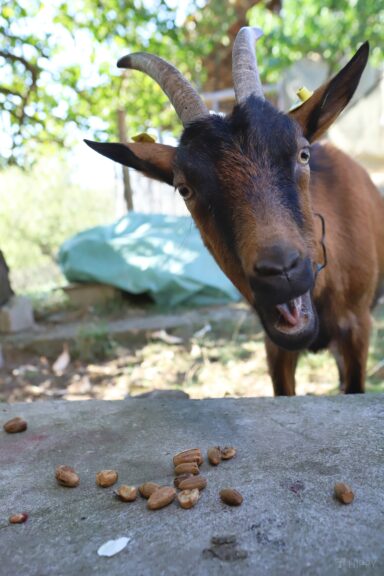Goats need a variety of foods to stay healthy and well-nourished. They need different grasses, leaves, and vegetables, but everybody needs a treat sometimes. So, can goats eat acorns?

Yes, goats love eating tasty acorns. Acorns have vitamins A and B, calcium, zinc, iron, and manganese, but, they also carry toxic amounts of tannic acid which can make your goats very sick. Moderation is very important to prevent acorn poisoning.
Goats should never be let loose around oak trees when they’re very hungry. They should not be given acorns before regular feedings so that they do not fill up to the point of reluctance to eat healthy components of a balanced diet.
Here is everything you need to know about feeding goats acorns…
The Benefits of Acorns in a Goats Diet
There are several benefits eating acorns has for goats.
Protein: Acorns are a valuable source of the proteins needed for muscle growth, tissue reparation, and boosting their immune systems.
Fat: Fat helps goats’ bodies absorb vitamins and minerals and give them energy. The fat supplied in acorns aids in brain development and general good health.
Energy: Acorns are a good source of energy that is needed for foraging and movement.
Weight: The calories and vitamins in acorns will boost your goat’s weight. Goats are not generally inclined to be obese.
Their healthy exercise from foraging, running around, and playing leapfrog on rocks, trees, and miscellaneous other farm animals can cause them to lose weight.
Their diet must include food that will help them hold body weight. This is especially important during pregnancy and nursing.
Reproduction: the vitamin A and E concentrations in acorns are important to good reproduction health.
These vitamins will ensure the kids are born healthy and that the doe’s milk will be of better quality in terms of production and nutritional content.
Vitamin A: maintains their epithelial development and strengthens their immune system.
Calcium: is essential to good bone and muscle development. It also is essential to the body’s nervous and cardiovascular functions, and it is important to prevent painful illnesses that lead to stiff, swollen joints, and poor growth and development.
Magnesium: helps your goats metabolize carbs and fat.
Iron: is needed to ensure the production of red blood cells and to transport oxygen through the blood.
Phosphorous: improves the function of enzymes, improves their energy metabolism, and helps to maintain a healthy acid-base balance in their bodies.
Zinc: breaks down proteins and can keep goats calm.
Manganese: pregnant does need manganese to produce healthy kids with good bone, brain, and organ development. Without manganese, goats often have stillbirths.
The Risks of Acorns in a Goat’s Diet
Oak trees have a high concentration of tannic acids. Tannins can lead to gastrointestinal issues when consumed in large quantities.
Tannic acids can also impact how protein is appropriately absorbed.
Overconsumption of acorns can lead to painful cramps in their guts, the accumulation of fluids in their legs, unwillingness to eat due to their stomachs being full or cramping, constipation, dehydration, and blood in their urine.
Can Goats Eat Oak Leaves?
Goats are natural foragers, meaning, they like to browse for food and will eat different grasses, leaves, bark, roots, and branches of a variety of plants.
This is a good thing because they need different textures and nutrients found in different food sources to keep their digestive systems functioning properly.
Giving your goats oak leaves mixed in with their hay or grass, in moderation, is perfectly fine.
Can Goats Eat Oak Bark?
Goats can eat the bark off of oak trees.
Goats eat bark because it is there, and it looks interesting. They do not gain major nutritional benefits from eating bark. Sometimes they just want something crunchy, and any tree will do.
Again, in moderation.
Can Goats Eat Oak Roots?
Goats do eat roots that are close to the surface and easy to stomp out. Oak tree roots are fairly close to the surface and are therefore easy to dig out.
Full of moisture, they will be a tasty snack. If your goats have to dig the roots out, they are getting a bit of a workout too.
As with all the other parts of the plant, beware of tannin levels.
Preparing Acorns for Goats
Feeding Raw Acorns
Because of the foraging instinct, goats will naturally eat raw acorns. The danger of this is that they will overeat, worsening the quantity of tannic acid.
The problem with feeding raw acorns in their shells is that the amount of tannin consumed is far greater because they will get the tannic acid from both the shell and the inner acorn.
It is better to prepare the acorns you want to treat your goats with. Here is how to prepare raw acorns to make them safer and to reduce the tannin the goats will be exposed to:
- Using a nutcracker, shell the acorns
- Discard the shells
- Soak the inner acorn for 24 hours to soften them and to dilute the amount of tannic acid in each acorn
As much work as this seems, it is far safer than allowing them to binge on acorns straight from the tree.
If you do not have an oak tree, you are lucky because your goats will not have the opportunity to make themselves sick. If you go on a hike or visit friends, gather acorns to feed your goats.
Feeding Your Goats Cooked Acorns
You can cook your acorns before feeding them to your goats, this will further help remove the tannin content of the acorn.
Cooking them is actually a very effective way to remove the tannin!
To prepare your acorns by cooking them you should:
- Using a nutcracker, shell the acorns and discard the shells
- You can boil the inner acorn whole, or you can chop them up, grind them, mash them, or even put them through your food processor before you cook them. The smaller the pieces, the quicker and more effective the boiling will remove the tannin
- Boil the acorns for 20 to 30 minutes
- Drain them and place them in freshwater
- Soak the cooked acorn for 6 hours before feeding them to your goats
How Many Acorns Can a Goat Safely Eat?
Moderation is the king/queen of all treats. Because goats are ruminators, they need a lot of raw vegetation such as hay, grass, and leaves to ensure their digestive systems work properly.
Your goats can only safely consume 1 to 2 acorns per day. Do not store up a week’s worth of acorns, i.e., 10 goats x 2 acorns per goat per day x 7 days a week = 140 acorns, and then feed all these to your goats at one time. They will get sick from the tannin content.
Also, it is best to hand-feed acorns so that the bullies do not get all the acorns before the shy goats get to the troughs.
Preventing and Treating Acorn Poisoning
Tannin poisoning is a terrible problem for goats to deal with. You would think that an animal would learn what it should steer clear of naturally.
But have you ever tried to stop eating chocolate? Jerky? Meat? Coffee?
We know the risks of binging, and we know what follows a binge. Hangovers, vomiting, diarrhea, headaches… and yet we still go back for more as soon as we feel better.
Goats are as guilty as we are of this. Symptoms of acorn poisoning include:
- Poor appetite
- Constipation
- Weight loss
- Blood in their stool
- Bloody noses
- Diarrhea
- Excessive water consumption
- Dull, depressed mood
Prevention is, of course, always better than a cure. To prevent acorn/oak poisoning:
- Only feed fresh acorns to your goats; do not feed acorns that have been on the ground for more than 24 hours
- Do not feed acorns from white oak trees as they have a higher concentration of tannic acid; instead, feed acorns from red oak trees as they have the lowest concentration of tannin of all oak trees
- Make sure you feed acorns in moderation; if you have an oak tree, limit the amount of time your goats have to forage for acorns
- Prepare your acorns properly to reduce the exposure of tannic acid to your goats
As soon as you suspect acorn poisoning, especially if they have access to an oak tree, call your vet!
Acorn poisoning can kill your goats within 3 to 7 days, and recovery with intervention can take 4 weeks. They will need a lot of help to relieve the symptoms and to get rid of the tannic acid.
Please do not delay contacting your vet.
Can Kids Eat Acorns?
Kids should never be given treats until they are fully weaned from their mothers (roughly 30 to 60 days).
With acorns, you should definitely delay this treat. I recommend that you wait until your kids are at least 6 months old. Even then, give them 1 acorn now and then until their bodies are fully developed.
This is… My Final Answer
Yes, you can treat, not feed, your goats an acorn or 2 now and then. Never more than 2 on the same day.
Prepare your acorns properly to prevent tannic acid from building up in your goat’s bodies.
This little nugget can be very beneficial to your goat’s development and ongoing health, but only in moderation.

Di-Anne Devenish Seebregts was raised in an environment where daily life consisted of hiking, environmental conservation, growing fruit and vegetables, and raising poultry for meat and eggs.
She combined her passion for the writing word with her love of the pride that comes with not relying on others. She raised three children (who are now adults) to value the environment, and understand the value of being self-sufficient.
Find out more about Di-Anne on our About Us page.
